Read: How to Teach Kids to Pray (age by age)
This post is sponsored by mysalahmat.com
The Arabic word for prayer ( ٱلصَّلَاة : As-Salah) is actually derived from root words – ص ل و (Sad-Lam-Waw) which means – prayer, supplication, follow closely, walk/follow behind closely, to remain attached.
In a horse race, when the second horse follows the first one so closely that its head always overlaps the first horse’s body that horse is called AL-MUSSALLI (i.e. the one who follows closely / remains attached).
I memorised this nasheed with my kids – we really enjoyed expanding our Arabic vocabulary with it and teaching important aspects of prayer – all in one poem. I wrote it down on paper and they read it till they memorised (at least the first half). It’s said that Ayesha رضي الله عنها was known for her vast knowledge of poetry. She had memorised more than twelve thousand lines of Arabic poetry.
“Indeed, I am Allah . There is no deity except Me, so worship Me and establish prayer for My remembrance.” [Quran, 20:14]
Salah, is an obligatory connection with Allah for all sane Muslims, whether rich or poor, male or female, black or white, strong or weak. This spiritual practice allows the believer to draw closer to Allah and take a pause from this fast-paced world 5 times a day facing the Ka’bah in Makkah (known as Qibla).
“Verily, the prayer is enjoined on the believers at fixed hours.” [Quran 4:103]
So, in summary, the Prayer-times are as follows:
- Fajr: After the true dawn but before sunrise.
- Dhuhr: Just after midday till the shadow of an object is the same as its length.
- ‘Asr: When the shadow of an object is the same as its length until it is twice its length.
- Maghrib: Just after the sunset until ‘Ishā begins.
- ‘Isha: When the twilight vanishes till half the night has passed. Twilight is the light (or glow) that remains in the western horizon after the sun goes down.
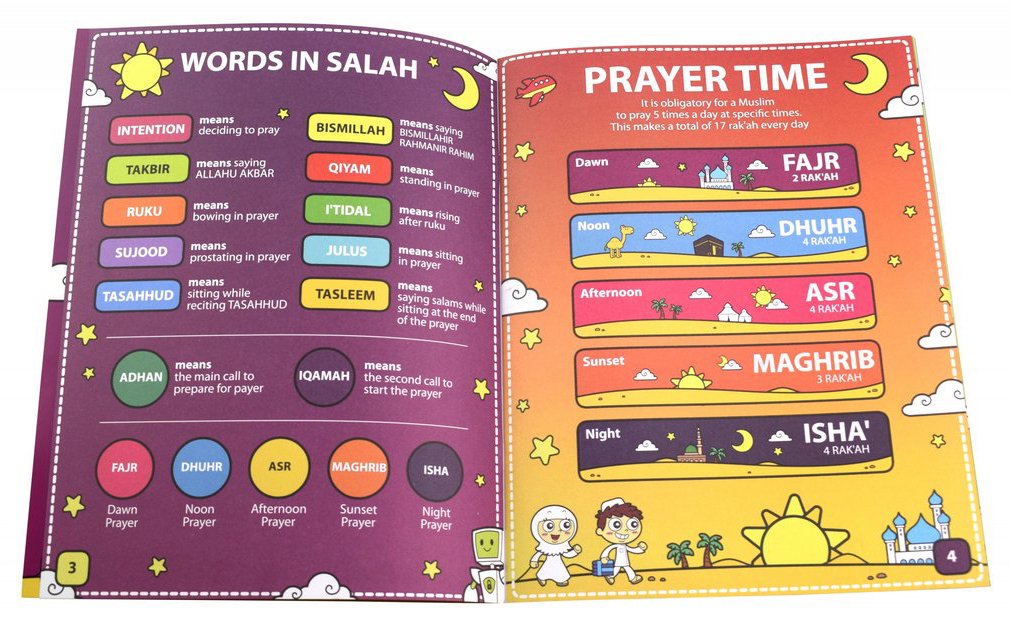
Salah is the second most important pillar of Islam, and is the most regular compulsory action in a Muslim’s life. We fast just one month (in Ramadan) a year; we give Zakah once a year; and Hajj is an obligation only once a life time (for those who are able). However, prayer is the one act that must be fulfilled at least 5 times a day. You may shorten it (while travelling), you may sit down to pray (if not well) – or even lie down (if you can’t even sit), but you can’t leave Salah (unless a woman is menstruating or is going through post-natal bleeding). In fact, Allah asked the Muslims to pray during the battle as well.
“…And if you fear (an enemy), perfrom Salat (pray) on foot or riding. And when you are in safety, offer the Salat (prayer) in the manner He has taught you, which you knew not (before).”[Quran, 2:238-239].
How to encourage kids to pray so it becomes a life-long habit in shaa Allah
Although it is not necessary for children to pray before 7, it is still wise to create an atmosphere in the home that encourages them to pray when they are young. A strong foundation is necessary. Small children respond well to visual cues and reward charts so you may use them to help them keep going. Build them a prayer corner and give them their own prayer dress, hijab/kufi, adhan clock and of course, an interactive prayer mat. I love using “My Salah Mat” with my kids and now that my eldest has learnt many parts of salah through it, I’ve hung it on the wall (by sewing ribbons on one end of it) so my youngest can learn from it as well by using it as an interactive educational tool.
We have already talked about “HOW TO TEACH KIDS TO PRAY“, but to encourage kids to stick to Salah 5 times a day every single day, it’s important to tell them how much they are actually gaining from it. Quran and Sunnah has outlined many benefits of Salah as a source of encouragement, so if you have to, there’s nothing wrong in setting up a reward system for your kids to help them kickstart their lifetime journey of Salah bi’idhnillah.
Benefits of Salah (Prayer) in This World
My niece turned 7 recently so I gathered all the kids (mine and my sister’s) to talk about the benefits of Salah. I asked the kids (ages: 7, almost-6 and 5) to take notes however they wish to – by writing it down or drawing whatever they understand because I will ask them in the end what they learnt from the discussion and they can refer to their notes to narrate in their own words. 7yr old wrote more while 5yr olds drew more.
1. It is a direct connection with Allah which brings peace to our heart and mindfulness in our lives
“Verily, in the remembrance of Allah do hearts find rest.” [QURAN 13:28]
Salah is a direct connection with Allah. It shows us how religion is a (practical) part of our daily life. Praying repeatedly throughout the day and interrupting the daily activities brings about the realization that our life’s focal point is Allah.
The Messenger of Allah (ﷺ) said: “The closest that a person can be to his Lord, the Mighty and Sublime, is when he is prostrating, so increase in supplication then.” [Nasa’i 1137]
The Messenger of Allah (ﷺ) said: “Allah (SWT) continues to look upon His slave while he is praying, so long as he does not turn away…” [Nasa’i 1195]
2. It is a strong identity of a Muslim and unites the Ummah
Actions will reflect what is in your heart. Prophet Muhammad (peace be upon him) was regular in his prayers and none of us have a cleaner heart than him.
Messenger of Allah (ﷺ) said: “The covenant between us and them is the Salat, so whoever abandons it he has committed disbelief.” [Tirmidhi 2621]
Prayer in congregation cultivates brotherhood, equality and humility between Muslims. The worshipers stand in rows, shoulder to shoulder, without any distinction of race, nationality, colour, wealth, family or status, and all pray together as one body. This act of unity helps demolish all barriers which stand between them.
Abu Huraira said, “I heard Allah’s Messenger (ﷺ) saying, ‘The reward of a prayer in congregation is twenty five times greater than that of a prayer offered by a person alone. The angels of the night and the angels of the day gather at the time of Fajr prayer.’ ” Abu Huraira then added, “Recite the Holy Book if you wish, for “Indeed, the recitation of the Qur’an in the early dawn (Fajr prayer) is ever witnessed.” (17:78). [Bukhari 648]
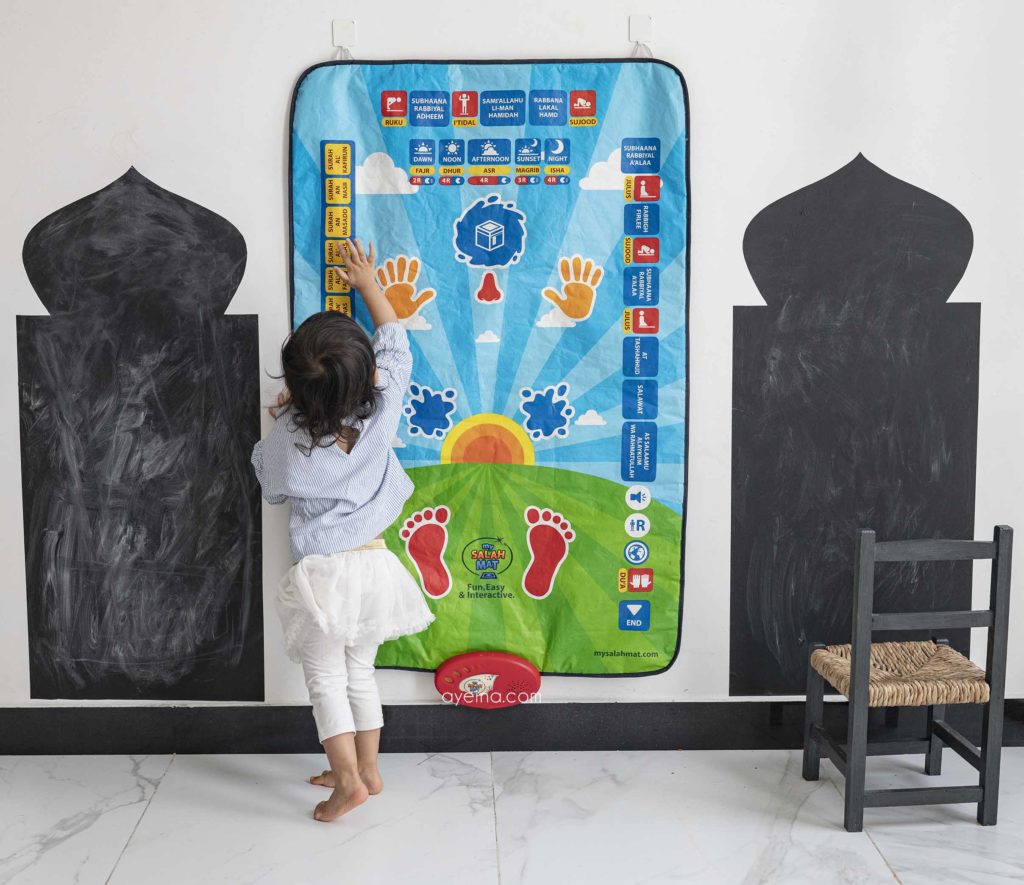
3. It keeps us away from bad deeds and Satan away from us
“…Indeed, prayer prohibits immorality and wrongdoing, and the remembrance of Allah is greater. And Allah knows that which you do.” [Quran, 29:45].
When I told the following hadith to kids, they all started their karate gestures on how they will fight Shaitaan through Salah.
The Messenger of Allah (ﷺ) said: When the Mu’adhdhin calls to prayer, Satan runs back vehemently.” [Muslim 389 b]
4. It rids us of laziness and improves our mental and physical health
Salah involves continuous gentle muscle contraction and relaxation with perfect harmony and balance. The body goes through a unique exercise routine during the Salah therefore these postures help to maintain fitness in the healthy individuals, leading to improved flexibility, muscle strength (ability of muscle to exert force) and muscle endurance (refers to the ability to perform many repetition). University of Malaya Medical Centre (UMMC) Cardiology Consultant Specialist Prof Dr Wan Azman Wan Ahmad stated that “12 ‘Rakʿah’ (unit for a set of actions in a prayer) equaled to 30 minutes of light exercises daily as recommended by health experts.” Other beneficial activities can be combined with prayer, such as walking to the local mosque.
“The Messenger of Allah ﷺ said: ‘If the people knew what (reward) there is in the ‘Isha’ prayer and fajr prayer, they would come even if they had to crawl.'” [Ibn Majah 796]
Ruk’u strengthens the back, extends the spine and increases the flexibility of hips and hamstrings. It relieve the stiffness at spine, neck, and back and help to improves posture as well as balance and co-ordination. According to industrial engineering Prof. Muhammad Khasawneh et al: “the complex physical movements of the ritual can reduce lower-back pain if performed regularly and properly. In some cases of chronic low back pain, as part of exercise plan, I often advise my Muslim patient to prolong the Ruku’u position every time they Pray for a few more seconds in order get the effective sustain stretch.”
Al- Gazal (2006) and Ayad (2008) stated that prostration (sajdah) is the only position in which the head is in a position lower than the heart and therefore, receives increased blood supply to the brain, stimulates the brain’s frontal cortex. This reduces the chances of brain hemorrhage and headache, helps to reduces high blood pressure. This surge in blood supply also has a positive effect on memory, concentration, and other cognitive abilities.
“When anything distressed the Prophet (ﷺ), he prayed.” [Abi Dawud 1319]
In Salah, a Muslim is required to focus during prayers and leave out all life distractions and connect with Allah during that time. The individual is fully awake and alert, but the mind is not focused on the external world or on the events taking place around the individual.
Prayer movements have many physical and physiological benefits, but we, as Muslims, pray out of love for Allah and as an obligation – not to gain physical fitness (which is just an added benefit from the bounties of Allah alhamdulillah).
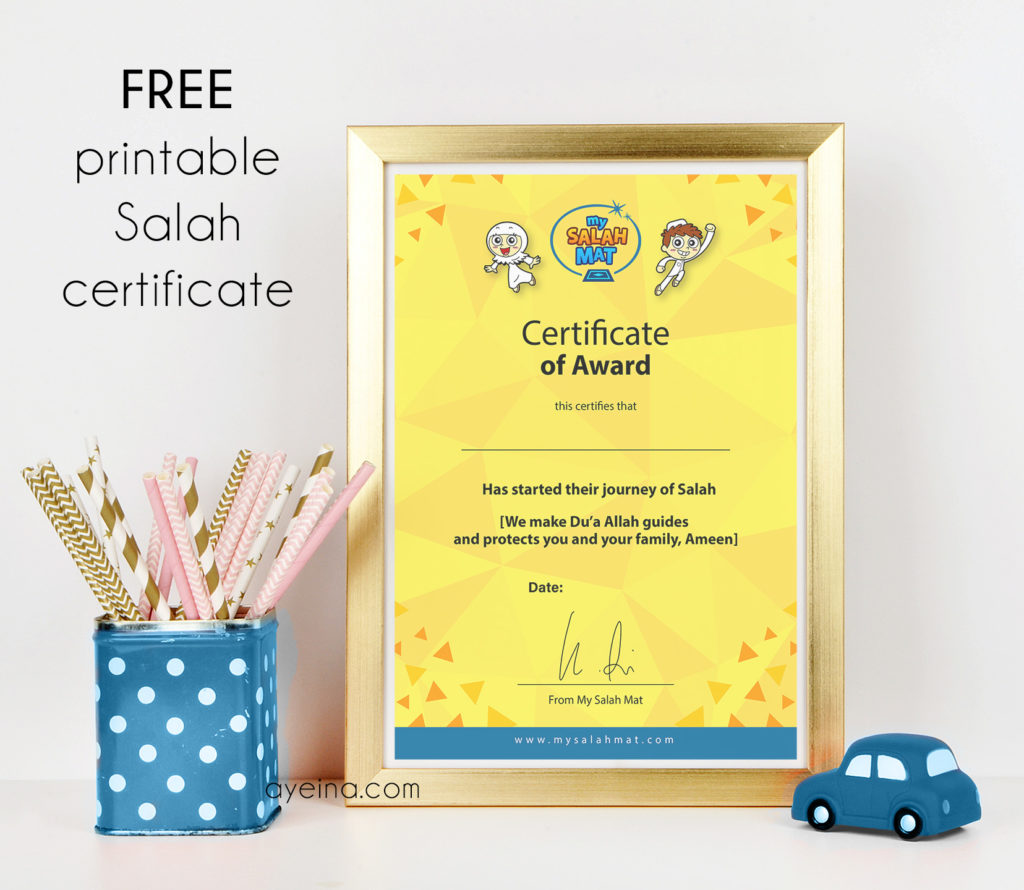
5. It teaches us discipline and time management
It gives a break from the daily grind to refocus our mind.
Messenger of Allah (ﷺ) said,…”By Him in Whose Hand is my life if your state of mind remains the same as it is in my presence and you are always busy in remembrance (of Allah), the angels will shake hands with you in your beds and in your roads; but Hanzalah, time should be devoted (to the worldly affairs) and time should be devoted (to prayer)”. He (the Prophet (ﷺ)) said this thrice. [Riyad as-Salihin 151]
As Taimiyyah Zubair beautifully said: “Salah is not an interruption, it is a break. In the daily grind we get so preoccupied with work that we begin to neglect ourselves. We ignore the pleas of our bodies because we falsely believe that what we are doing at the moment is of utmost importance and cannot be delayed by a second even. Or we are unable to tend to our needs because of the demands of people. We constantly bear the stress on our shoulders, worrying, and working away. Salah rescues us from this madness. It extracts us from the grip that people have over us, and from the endless work that is consuming us and reminds us that no human being, no work, nothing is more important than Allah. It teaches us to say no. To set boundaries with people. And that people must learn to respect those boundaries. It teaches us that we matter. It forces us to disconnect from everything, even our thoughts, and to connect with Allah, and by extension with ourselves. Salah is self-care.”
6. It brings more barakah (blessings)
“And enjoin prayer upon your family and be steadfast therein. We ask you not for provision; We provide for you, and the outcome is for righteousness.” [Quran, 20:132]
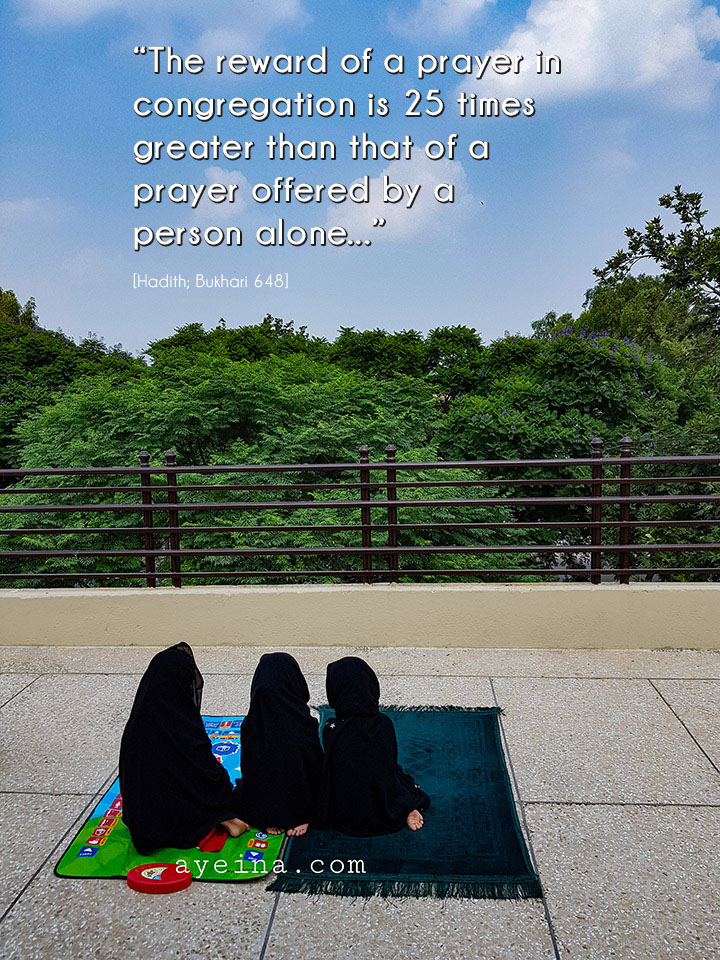
7. It is a powerful medium to seek help and thank Allah for His blessings
“And seek help through patience and prayer, and indeed, it is difficult except for the humbly submissive .” [Quran 2:45]
Children were amazed at how Prophet ﷺ prayed! Talking about sunnah not only makes Islam look practical, it also helps kids love their last Prophet ﷺ even more ❤️
The Prophet (ﷺ) stood (in prayer at night) until his feet swelled up, and it was said to him: Allah has forgiven your past and future sins. He said: “Should I not be a thankful slave?'” [Nasa’i 1644]
8. It cleanses us and provides protection with Allah
Prophet (ﷺ) said: “Whoever offers the morning prayer, he is under the protection of Allah, the Mighty and Sublime.” [Ibn Majah 3946]
Prayer not only gives a deep connection with God, but in prayer one establishes patience, humility and sincerity. Prayer provides a means of repentance and is a restrainer from bad deeds. Praying five times a day engages the believer in constant remembrance of God and keeps him away from any deed that will earn the displeasure of Allah. Just as the body requires physical needs such as food and water, the soul has spiritual needs. The needs of the soul are provided by acts of worship, the most important of which is prayer.
I heard the Messenger of Allah (ﷺ) saying, “Say, if there were a river at the door of one of you in which he takes a bath five times a day, would any soiling remain on him?” They replied, “No soiling would left on him.” He (ﷺ) said, ” That is the five (obligatory) Salat (prayers). Allah obliterates all sins as a result of performing them.” [Riyad as-Salihin 1042]
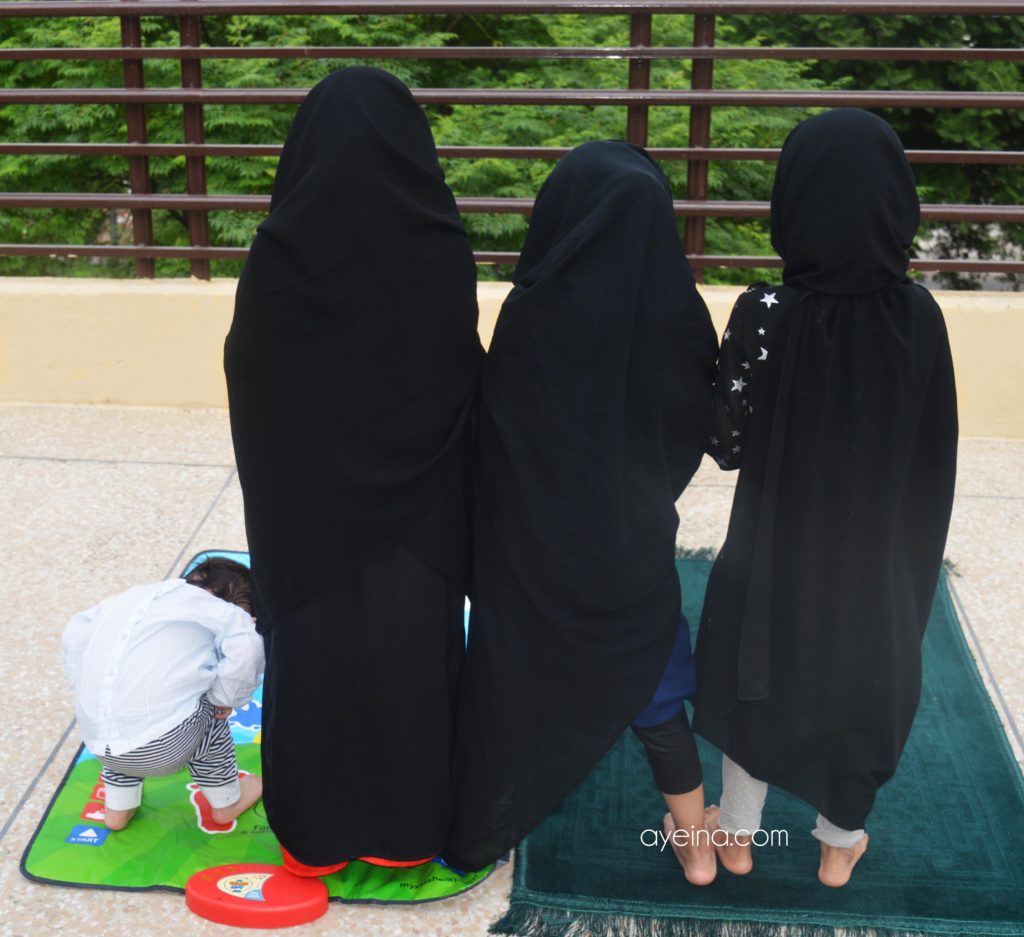
Benefits of Salah (Prayer) in The Hereafter
I sat down with the kids (ages: 7, almost-6 & 5) to highlight the importance of Salah because this is ONE habit that they are going to stick to 5 times a day for the rest of their lives (in shaa Allah). But to build a life-long habit of SUCH an important pillar of Islam, we have to lay the foundation as strong as we can! Because years and years of consistency is going to pile up over that foundation!
So once I told them all the Motivational verses and ahadith I could about Salah on its benefits in this world, it was time to highlight its benefits in the aakhirah! They know what Salah is. They know that it’s an obligation. But I really wanted them to build this strong self-motivation because I am not going to supervise their every move – especially as they grow up and reach the age of 10 and beyond. So this HAS to be an intrinsic motivation.
9. It will be the first deed to be accountable for in aakhirah:
The Messenger of Allah ﷺ said, “The first thing for which a person will be brought to account will be his Salah. If it is complete (all well and good), otherwise Allah will say: ‘Look and see if My slave did any voluntary prayer.’ If he is found to have done voluntary prayers, his obligatory prayers will be completed therewith.” [Nasa’i 467]
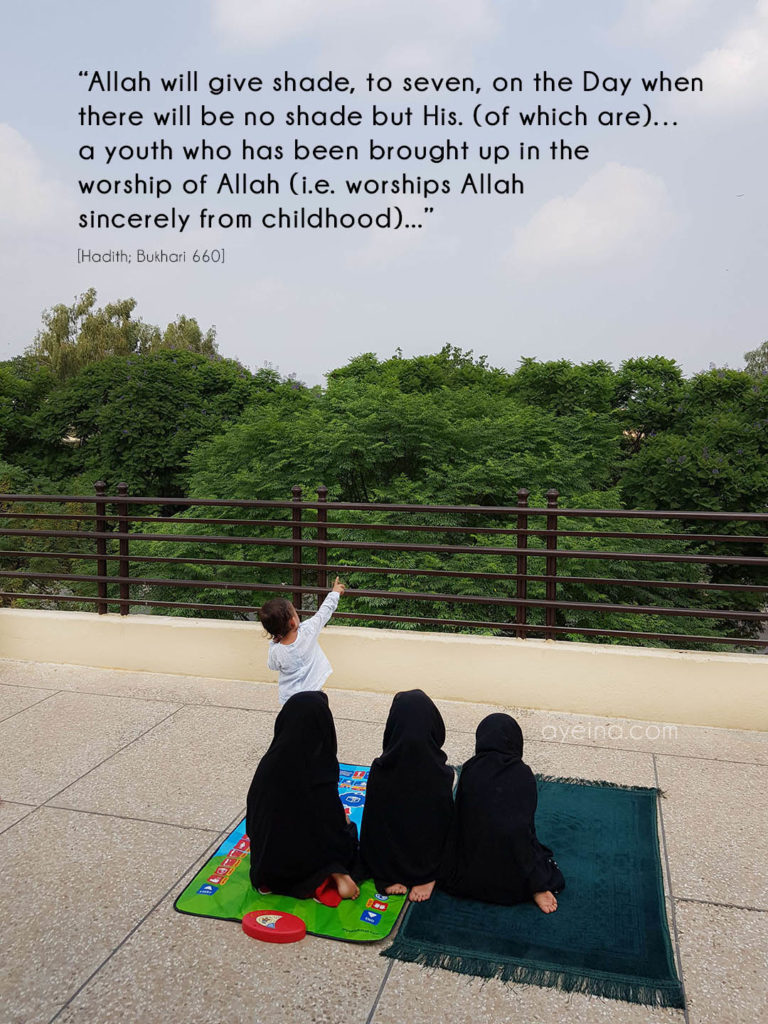
10. It will result in multiple rewards:
Anas bin Malik narrated: “On the Night of Isra, fifty prayers were made obligatory upon the Prophet. Then it was decreased until it was made five. Then it was called out: ‘O Muhammad! Indeed My Word does not change; these five prayers will be recorded for you as fifty.'” [Tirmidhi 213]
You can tell kids the whole story of Isra wal Miraj if you want to engage them in deeper conversation on the topic.
‘Uthman bin ‘Affan (May Allah be pleased with him) reported: I heard the Messenger of Allah (ﷺ) saying: “One who performs ‘Isha’ prayer in congregation, is as if he has performed Salat for half of the night. And one who performs the Fajr prayer in congregation, is as if he has performed Salat the whole night.” [Riyad as-Salihin 1071]
11. It will be a means to be under the shade of Allah
The Prophet (ﷺ) said, “Allah will give shade, to seven, on the Day when there will be no shade but His. (of which are)…a youth who has been brought up in the worship of Allah (i.e. worships Allah sincerely from childhood), a man whose heart is attached to the mosques (i.e. to pray the compulsory prayers in the mosque in congregation),…and a person who remembers Allah in seclusion and his eyes are then flooded with tears.” [Bukhari 660]

12. It will be a means to be recognized by Muhammad ﷺ in the Hereafter
It was narrated from Abu Hurairah that the Prophet (ﷺ)…said:… “You are my Companions. My brothers are those who will come after me. I will reach the Cistern ahead of you.” They (the companions – may Allah be pleased with them) said: “O Messenger of Allah, how will you recognize those of your nation who have not yet come?” He said: “If a man has a horse with a blaze on its forehead and white feet, don’t you think that he will recognize it among horses that are deep black in color?” They said: “Of course.” He said: “On the Day of Resurrection they will come with radiant faces, hands, and feet, because of the traces of ablution.” [Ibn Majah 4306]
I asked the kids: So, who wants to drink from Kawthar? The kids raised their hands excitedly. I took their names individually to make dua for them and their faces brimmed with joy alhamdulillah. Taking kids’ names during such discussions helps them feel like it IS about them! And that they CAN! in shaa Allah!
13. It is a means for admission in Jannah.
“And they who carefully maintain their prayers – Those are the inheritors. Who will inherit al-Firdaus. They will abide therein eternally.” [Quran, 23: 9-11]
14. Special gate of Jannah for those who pray
The Messenger of Allah (ﷺ) said, “…one who is constant in Salat (prayer), will be called from the Gate of Salat…” [Riyad as-Salihin 1216]
15. It is a means to see Allah
Jarir bin ‘Abdullah Al-Bajali (May Allah be pleased with him) reported: We were sitting with the Messenger of Allah ﷺ when he looked at the full moon and observed, “You will see your Rubb in the Hereafter as you see this moon having no difficulty in seeing it. So try your best to perform the prayers before the rising of the sun and that before its setting.” [Riyad as-Salihin 1051]
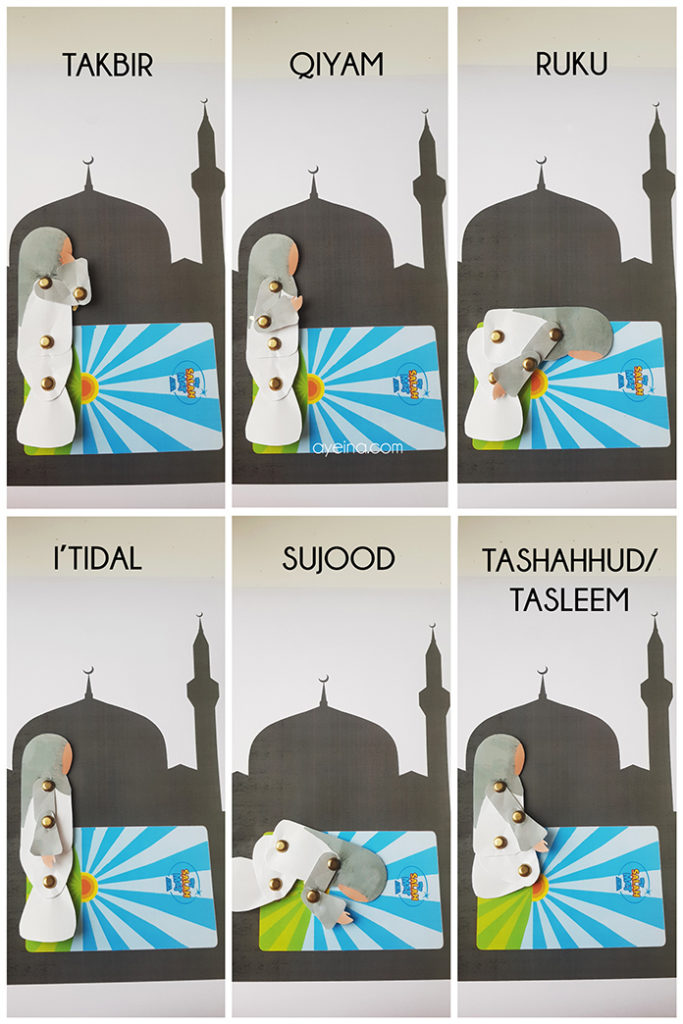
Conclusion
The parents should never tire of reminding and advising, even if the children neglect prayer repeatedly. They should never despair the guidance of their children. No one knows when a word will be of benefit. Let them know that Allah is not in need of our Salah, we are!
“And We had certainly given Luqman wisdom , “Be grateful to Allah .” And whoever is grateful is grateful for himself. And whoever denies – then indeed, Allah is Free of need and Praiseworthy.” [Quran 31:12]
If you think that the child may need more encouragement, especially if they are heavily influenced by their friends, it could be a good idea to invite his/her friends to his/her salah-bration (salah party/gathering). Not all households may have the same Islamic environment as yours and it’s hard to dictate your children’s friends all the time, so this way you can not only encourage your own children, but also their friends to pray. In the gathering, each kid can take a turn on “my salah mat” and try to mimic each other’s actions. Good deeds are contagious. When one person proudly does it, others follow too…You may check @kitabkids on how she did it for her son.
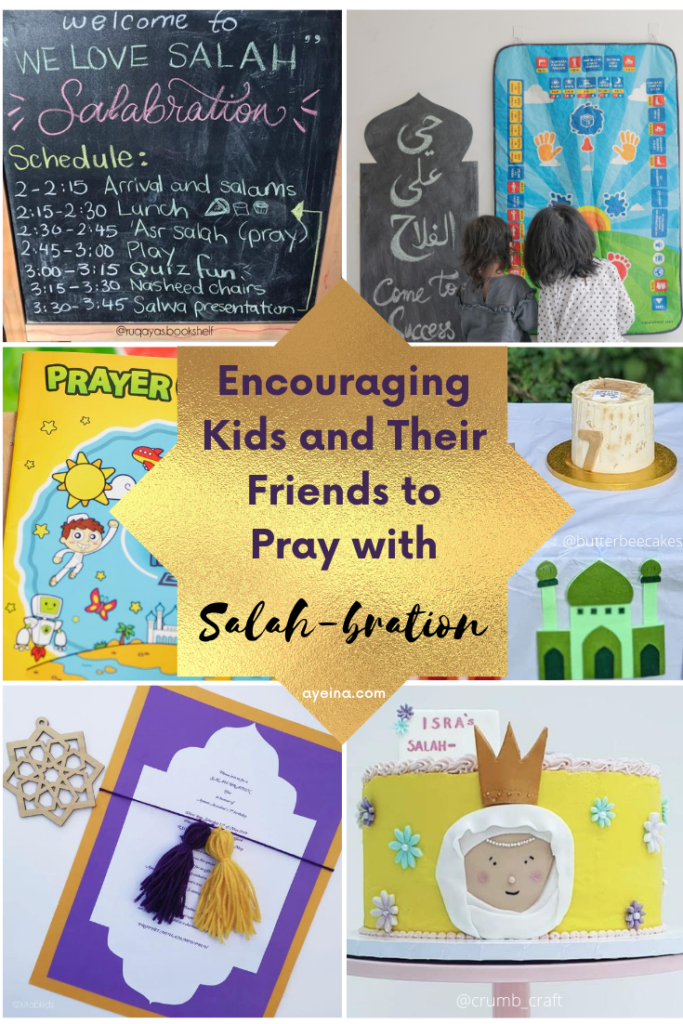
Ruqayyas Bookshelf wrote: “I attended a “salah-bration” party at a friend’s house after her daughter turned 7…At the party, there was an amazing salah quiz, the kids prayed together, and every child received a parting gift of the 30th juz’ and a lovely hijab…All the guests were asked to write a letter to the little girl letting her know why salah was special to them. What a beautiful way to celebrate the beginning of a lifetime of turning to Allah (swt).”
How do you encourage your child to pray 5 times a day (especially Fajr Salah)? Please let me know in the comments below and feel free to print out this free SALAH CERTIFICATE download for the kids!
You can also print this article (summarized) as PDF HERE!
For kids, you can print these color-in salah mats as PDF HERE!
Read: Practical Steps to Pray on Time




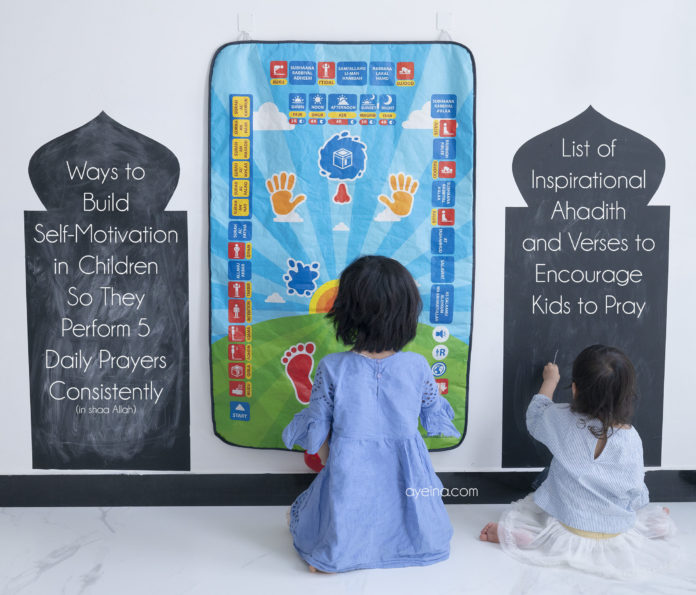
That’s an interesting definition of the root words. Thanks for telling how to know the prayer timings from the position of the sun and daylight and night, however I am unclear of the Qaza timings for Dhuhr, Asr & Isha. The book and prayer mat look so colourful and detailed and amazing, any kids would love to interact with them. Awww your kids physical chopping Shaitan is so cute. Cute Salah certificate.
Very well written informative post and Mashallah you have a very activity-based creative way of encouraging your children to offer Salat! 😀
Qada is a missed prayer. Missing the prayer intentionally is considered a major sin, unless that is for a legitimate excuse such as sleeping or unintentionally forgetting (If that happens, pray as soon as you get up or recall).
…Muhammad ﷺ said: “If anyone forget saying prayer, he should observe it when he recalls it, for Allah has said (in the Qur’an): “Establish prayer for my remembrance”… [Abu Dawud]
As for intentional qada, hope this helps: https://islamqa.info/en/answers/111783/how-can-he-make-up-for-missed-prayers
JazakAllah kahir for sharing. I was a bit slack with my eldest and she never prayed before puberty…but alhamdulillah she now prays all of them and is much more dedicated than I am.
But I am trying to start earlier with the youngest and instil a love for salah now.
Alhamdulillah that she developed a love for Salah even at this age. It’s not easy for tweens or teenagers in this era. May Allah keep us all steadfast!
My father always reminded us to design our life around the daily 5 Salah. Like you said, modeling the behaviour goes a long way than saying. May Allah make our children amongst those who establish Salah. Ameen
Aameen. Planning your day around Salah is such a natural progression into your daily tasks. You neither overschedule (as you do not micromanage each minute of the day), nor do you slack and feel the lack of productivity in general. Alhamdulillah for a great disciplinary and goal-setting tool from Allah!
subhanallh! May Allah reward you immensely sister! beautiful article.
Thank you for sharing. May Allah reward you. I will put into practice all you have shared for i have a 9 year old and 7 year old